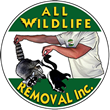Raccoon droppings and urine around the home are more than annoying, they’re covered in harmful diseases that can be easily transmitted to you and your family. Cleaning up and decontaminating the area has never been more important.
Do you need wildlife removal services? Request a quote today!
Keep your family safe by knowing ahead of time what dangers are found in raccoon feces.
1. Raccoon Roundworm
The most commonly cited raccoon disease, baylisascaris procyonis, is a particularly repulsive feature of raccoon feces. This parasite lives in a raccoon’s internal tract, entering the atmosphere each time the raccoon goes to the bathroom. Approximately 50 worms are excreted each bathroom trip. It’s extremely resistant to physical and chemical cleaning, which significantly lengthens its lifespan in the environment.
Roundworm eggs can easily become airborne. Simply breathing the air around contaminated coon poop puts you at risk. If you have children playing outside in areas raccoons go to the bathroom, they should wash their hands thoroughly with antibacterial soap and be closely monitored after for signs of symptoms.
2. Salmonella
Salmonella is another common threat found in raccoon feces. It’s introduced to humans by accidental ingestion, commonly as one moves their hands to the mouth. Unfortunately, this virus can remain dormant for a long time.
It may only act up after a change in environment, such as transfer to a new host. This change triggers a new range of activity, leaving the host with high fever, severe diarrhea, and abdominal pain. Treatment leads to an easy recovery but hospitalization has been sought in severe cases.
3. Leptospirosis
This parasite is found in raccoon urine, and it will quickly contaminate every surface it comes into contact with. People are commonly infected after direct contact through an open wound or incidental ingestion.
Leptospirosis often contaminates water sources, such as puddles on the property, dirtying the entire body of water. Although it’s not found in raccoon poop, this bacterial infection should not be taken lightly. The bacteria is still found on their latrine site and it’s an active part of body waste.
3. Giardia
Raccoon feces carry giardia, which dirties every surface, soil, and body of water it touches. Humans are infected through ingestion. This protozoal parasite multiplies in the small intestine, feeding on sugar released from digested food in the stomach that converts into ethanol. The ingested droppings contain infective cysts that wreak havoc on the human body.
People with poor or compromised immune systems are at a higher risk of contracting this disease. Anyone who has the unfortunate scenario of drinking water contaminated with this parasite could find themselves with severe diarrhea and a feeling that’s been described as slightly drunk. Additional painful symptoms include nausea, abdominal pain, and dehydration.
5. The Latrine Site
Here is the homebase where the above diseases stem from. Raccoons do their business in the same spot—the latrine, meaning any raccoons snooping around your property or in your home may well create their bathroom on site. Whether the raccoons are burrowed under the deck or they found a way in through the roof, they’re going to the bathroom somewhere nearby.
Latrine sites host fleas, ticks, and other bacteria, making decontamination a top priority. Leaving the feces to accumulate can result in growing fungal spores and bacteria, in addition to the viruses above. Removal and thorough cleaning are necessary to rid the area of all possible diseases. You’ll need to invest in strong disinfectant compounds and items that produce high heat and flames, as some diseases are resistant to disinfectants.
Some of these diseases aren’t exclusive to raccoon feces. If you have little ones and playgrounds around the home, be extra careful and keep them clean so they don’t attract raccoons. If you think you have raccoons living in your home, call wildlife removal services today.
Do you need wildlife removal services? Request a quote today!
